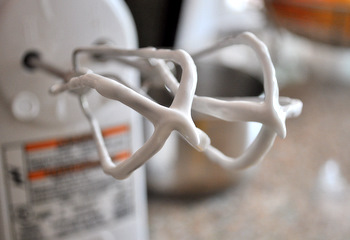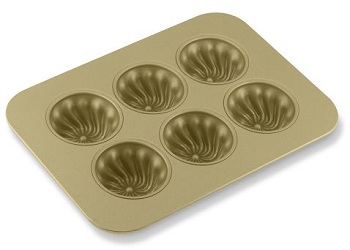
Italian meringue is made by beating egg whites until they reach soft, fluffy peaks, then slowly streaming in boiling sugar and beating the mixture until it is thick and glossy. A basic meringue, also known as a French meringue, is made by beating granulated sugar into egg whites until the mixture reaches soft peaks. The hot sugar syrup used to make Italian meringue essentially cooks the egg whites as it is incorporated. This means that you don’t need to cook or bake the meringue before using it. It also means that the meringue is going to be a lot more stable and less likely to deflate or weep than a simple meringue is.
When making an Italian meringue, it is important to add the boiling sugar syrup very slowly, so that you don’t accidentally cook your eggs by overheating them. It is also important to keep the mixer (or your arm, if you are buff/brave) working on a medium-low speed while you work, so that the syrup is incorporated consistently without flying off the whisk attachment or beaters of your mixer. Once the syrup has been incorporated, the meringue is beaten at high speed for several minutes until it has cooled down. Unlike a simple meringue, you cannot overbeat an Italian meringue, so there is no need to worry about that. Once the meringue has cooled down somewhat (some recipes will call for it to be warmer or closer to room temperature for use), it can be used in a variety of recipes.
You’ll frequently see Italian meringues called for as pie toppings, especially for Lemon Meringue Pie, and in desserts like Baked Alaska. Italian meringues are used in some macarons and the meringue can also be piped and baked to make plain meringue cookies. One of the most popular uses for Italian meringue, however, is making rich, buttery Buttercream Frosting, where butter is beaten in to an Italian meringue until the mixture is transformed into one of the most decadent ways to top of a cake or cupcake.





Ginger
February 29, 2012Good article, but I have one question. Aside from the method, how do Italian Meringue, and Swiss Meringue differ? Are they used differently, do they have different properties, etc?
Nicole
March 1, 2012For a Swiss meringue, the egg whites and sugar are whisked together over the heat until the mixture is quite hot and the sugar is dissolved, then it is removed from the heat and beaten until the meringue is fluffy, glossy and has cooled back down (7-10 minutes).
The two don’t differ much in texture (although they are both smoother than a French meringue that is not heated at all) but I find that Italian Meringue is more stable than swiss meringue and that the Italian is much easier to make.
Kay Kemp
March 4, 2012I’m pretty sure that this is how my Mother and her Mother frosted my birthday cakes. I think that they called it “7-minute frosting.” I remember a thin stream of boiling sugar going into beaten egg whites in the top of a double boiler. I was supposed to stay out of the way and not interrupt the process or it would be ruined. Grandma did it with a hand whisk (she also made angel-food cake with this tool!) but Mother had an electric hand mixer. I never have tried todo it, but it was sooo good.
laura
April 27, 2012Can I frost a cake with Italian merimngue the day ahead? how many days will italian merigue keep at room temperature? Thank YOu
Christina
April 15, 2014Is Italian meringue and/or 7 minute frosting safe for pregnant women?
kath delgado
June 5, 2014i am hoping to use this icing to cover my daughters wedding cake…in Tenerife… in August… can I freeze it? How long can I keep it in the fridge?
Anthony
May 30, 2018Can i use italian meringue for sponge cake batter instead of french meringue?
Nicole
May 30, 2018Anthony – I would not because an Italian meringue is already cooked (by the hot syrup), while French meringues are not and will bake in the oven as the cake cooks. While the cake should still cook in the oven, you will not get the same results. A cake recipe that calls for a french meringue expects that meringue to bake in the oven and that is what the structure of the finished cake depends on.